Relationship Between Attitudes, Job Satisfaction, Motivation at Work
VerifiedAdded on 2023/05/30
|11
|2591
|277
Report
AI Summary
This report delves into the significant impact of employee motivation, job satisfaction, and attitudes on organizational behavior, drawing upon theories like Herzberg's two-factor theory. It examines the components of attitudes (affective, behavioral, and cognitive) and various job attitudes, including job satisfaction, involvement, organizational commitment, perceived support, and employee engagement. The report further analyzes factors influencing job satisfaction, such as pay, benefits, work environment, and relationships with colleagues and supervisors. The analysis highlights how these factors affect employee productivity, company image, competitive advantage, and organizational commitment. Ultimately, the report underscores the interconnectedness of attitudes, motivation, and job satisfaction in fostering a positive and productive work environment.
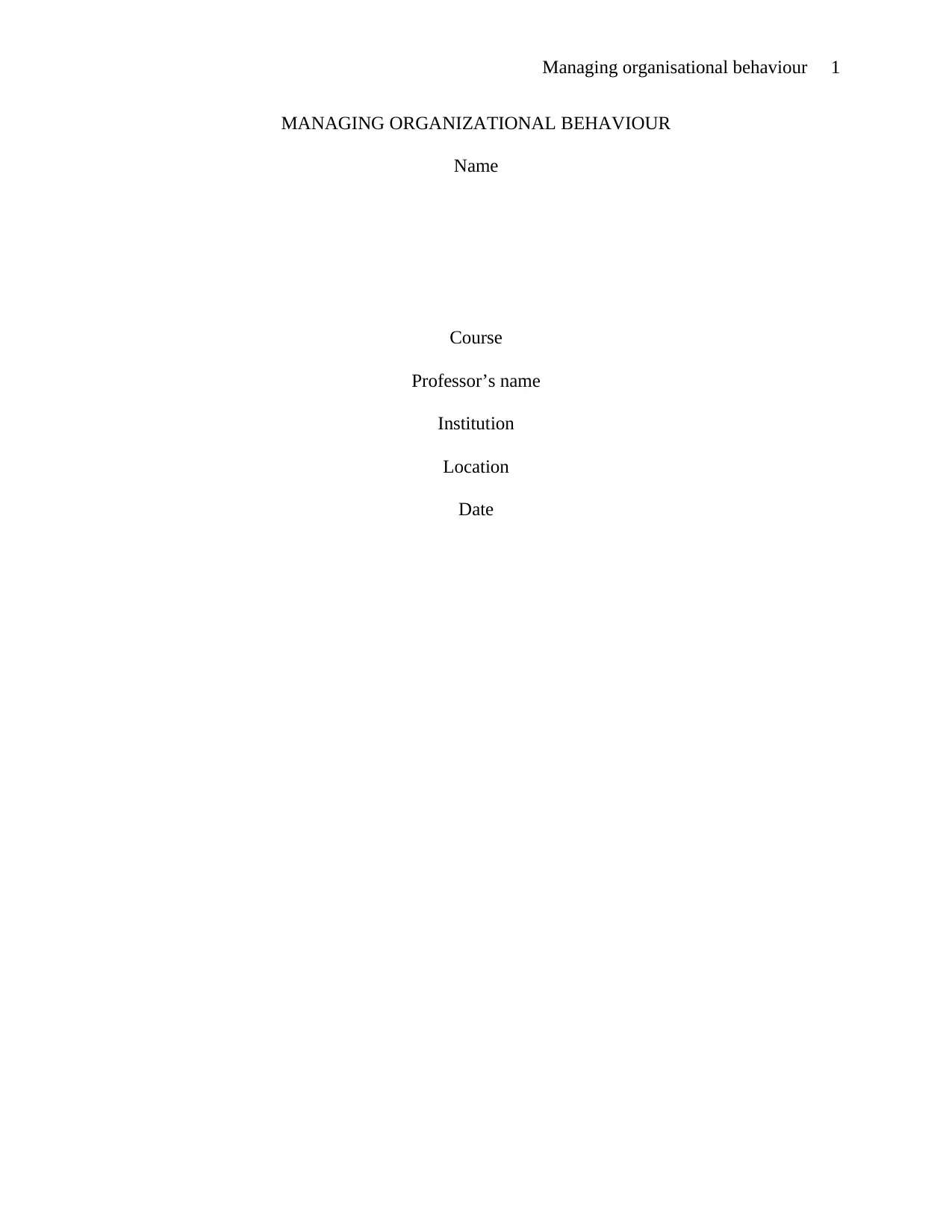
Managing organisational behaviour 1
MANAGING ORGANIZATIONAL BEHAVIOUR
Name
Course
Professor’s name
Institution
Location
Date
MANAGING ORGANIZATIONAL BEHAVIOUR
Name
Course
Professor’s name
Institution
Location
Date
Paraphrase This Document
Need a fresh take? Get an instant paraphrase of this document with our AI Paraphraser
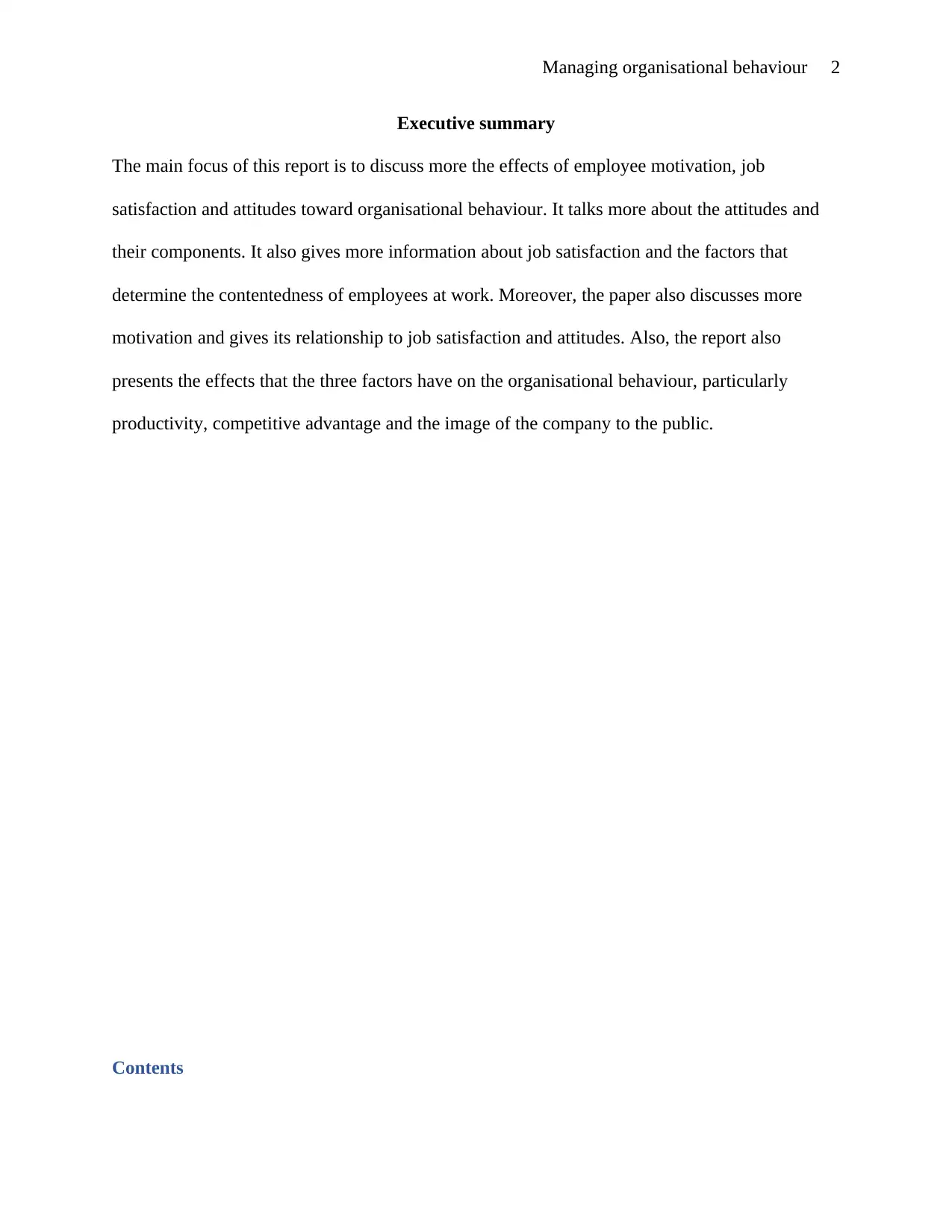
Managing organisational behaviour 2
Executive summary
The main focus of this report is to discuss more the effects of employee motivation, job
satisfaction and attitudes toward organisational behaviour. It talks more about the attitudes and
their components. It also gives more information about job satisfaction and the factors that
determine the contentedness of employees at work. Moreover, the paper also discusses more
motivation and gives its relationship to job satisfaction and attitudes. Also, the report also
presents the effects that the three factors have on the organisational behaviour, particularly
productivity, competitive advantage and the image of the company to the public.
Contents
Executive summary
The main focus of this report is to discuss more the effects of employee motivation, job
satisfaction and attitudes toward organisational behaviour. It talks more about the attitudes and
their components. It also gives more information about job satisfaction and the factors that
determine the contentedness of employees at work. Moreover, the paper also discusses more
motivation and gives its relationship to job satisfaction and attitudes. Also, the report also
presents the effects that the three factors have on the organisational behaviour, particularly
productivity, competitive advantage and the image of the company to the public.
Contents
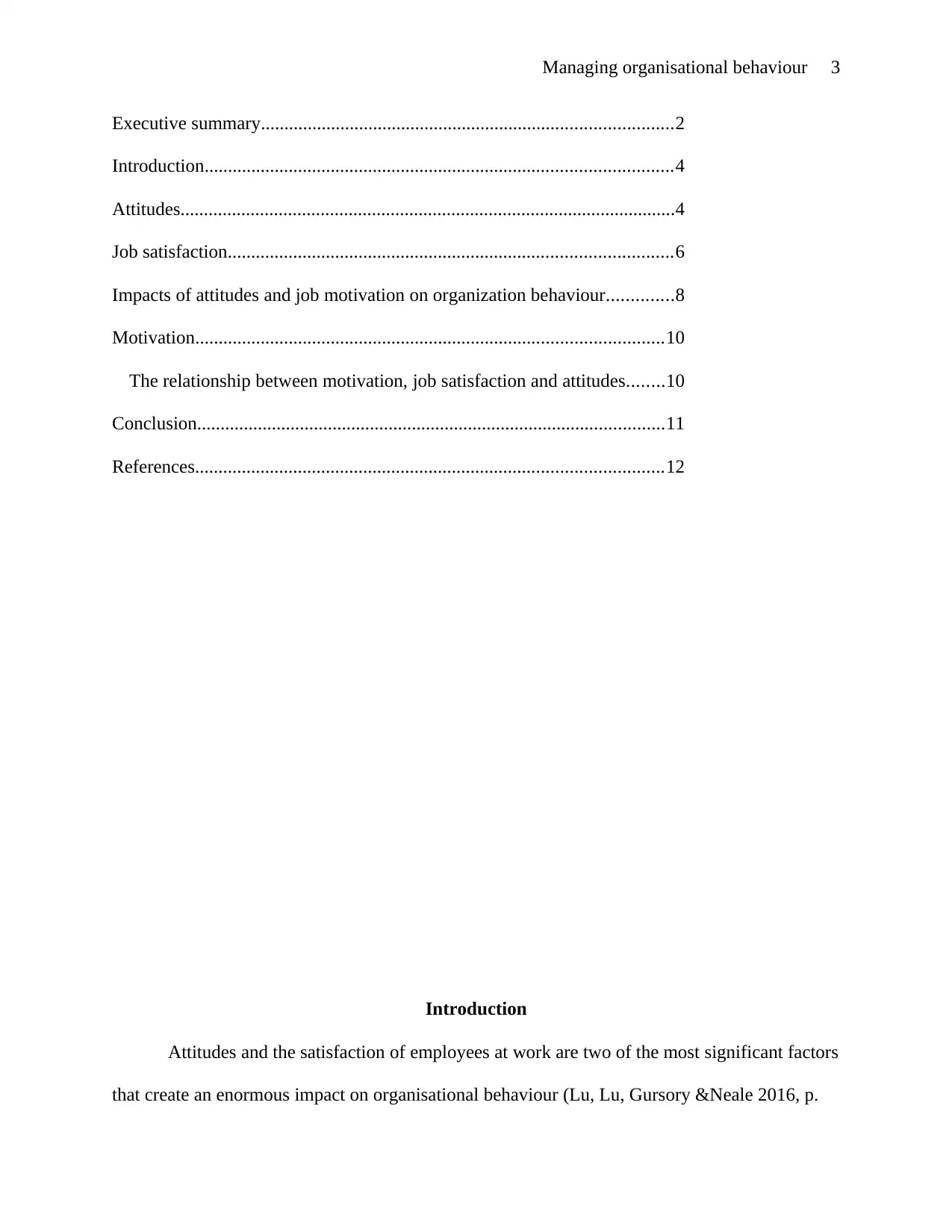
Managing organisational behaviour 3
Executive summary........................................................................................2
Introduction....................................................................................................4
Attitudes..........................................................................................................4
Job satisfaction...............................................................................................6
Impacts of attitudes and job motivation on organization behaviour..............8
Motivation....................................................................................................10
The relationship between motivation, job satisfaction and attitudes........10
Conclusion....................................................................................................11
References....................................................................................................12
Introduction
Attitudes and the satisfaction of employees at work are two of the most significant factors
that create an enormous impact on organisational behaviour (Lu, Lu, Gursory &Neale 2016, p.
Executive summary........................................................................................2
Introduction....................................................................................................4
Attitudes..........................................................................................................4
Job satisfaction...............................................................................................6
Impacts of attitudes and job motivation on organization behaviour..............8
Motivation....................................................................................................10
The relationship between motivation, job satisfaction and attitudes........10
Conclusion....................................................................................................11
References....................................................................................................12
Introduction
Attitudes and the satisfaction of employees at work are two of the most significant factors
that create an enormous impact on organisational behaviour (Lu, Lu, Gursory &Neale 2016, p.
⊘ This is a preview!⊘
Do you want full access?
Subscribe today to unlock all pages.

Trusted by 1+ million students worldwide
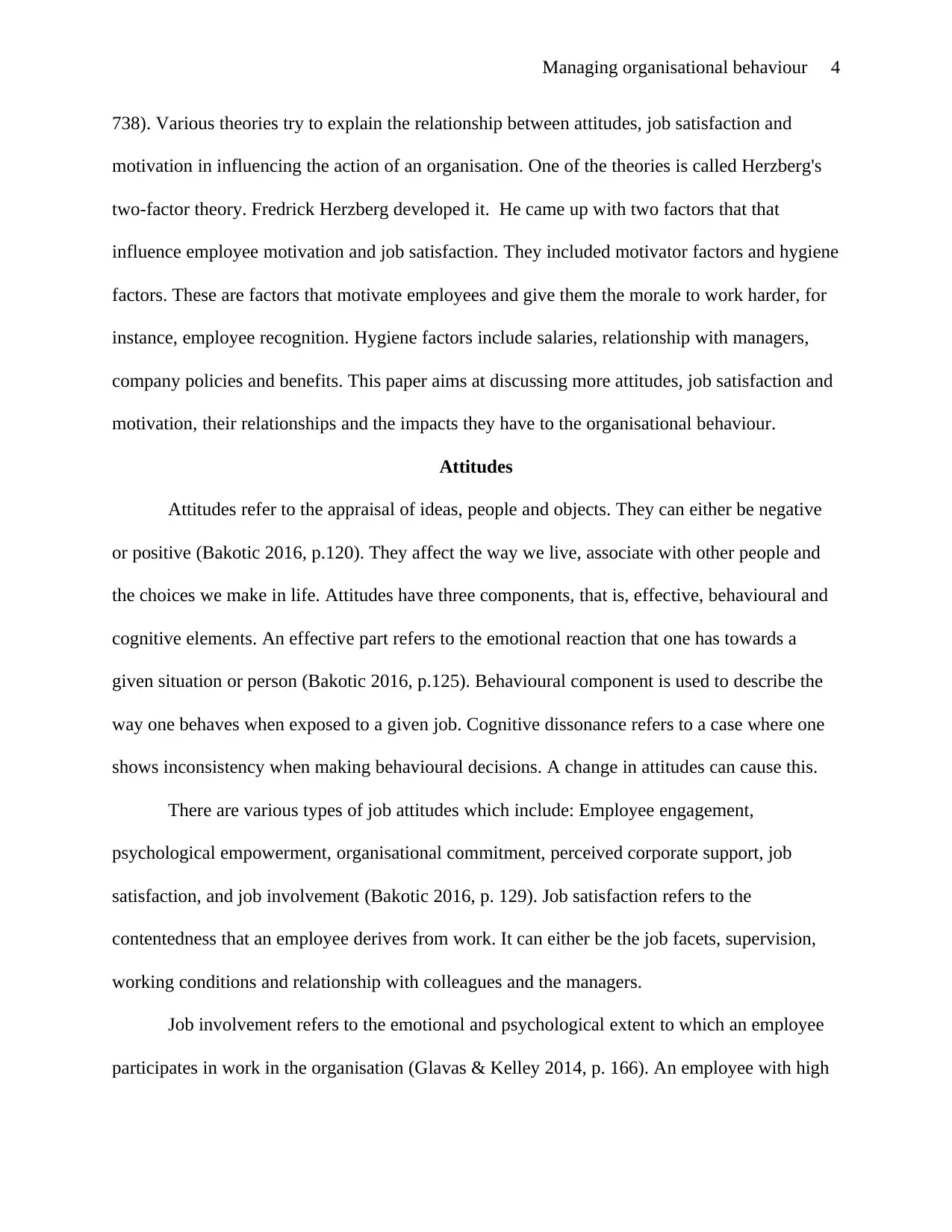
Managing organisational behaviour 4
738). Various theories try to explain the relationship between attitudes, job satisfaction and
motivation in influencing the action of an organisation. One of the theories is called Herzberg's
two-factor theory. Fredrick Herzberg developed it. He came up with two factors that that
influence employee motivation and job satisfaction. They included motivator factors and hygiene
factors. These are factors that motivate employees and give them the morale to work harder, for
instance, employee recognition. Hygiene factors include salaries, relationship with managers,
company policies and benefits. This paper aims at discussing more attitudes, job satisfaction and
motivation, their relationships and the impacts they have to the organisational behaviour.
Attitudes
Attitudes refer to the appraisal of ideas, people and objects. They can either be negative
or positive (Bakotic 2016, p.120). They affect the way we live, associate with other people and
the choices we make in life. Attitudes have three components, that is, effective, behavioural and
cognitive elements. An effective part refers to the emotional reaction that one has towards a
given situation or person (Bakotic 2016, p.125). Behavioural component is used to describe the
way one behaves when exposed to a given job. Cognitive dissonance refers to a case where one
shows inconsistency when making behavioural decisions. A change in attitudes can cause this.
There are various types of job attitudes which include: Employee engagement,
psychological empowerment, organisational commitment, perceived corporate support, job
satisfaction, and job involvement (Bakotic 2016, p. 129). Job satisfaction refers to the
contentedness that an employee derives from work. It can either be the job facets, supervision,
working conditions and relationship with colleagues and the managers.
Job involvement refers to the emotional and psychological extent to which an employee
participates in work in the organisation (Glavas & Kelley 2014, p. 166). An employee with high
738). Various theories try to explain the relationship between attitudes, job satisfaction and
motivation in influencing the action of an organisation. One of the theories is called Herzberg's
two-factor theory. Fredrick Herzberg developed it. He came up with two factors that that
influence employee motivation and job satisfaction. They included motivator factors and hygiene
factors. These are factors that motivate employees and give them the morale to work harder, for
instance, employee recognition. Hygiene factors include salaries, relationship with managers,
company policies and benefits. This paper aims at discussing more attitudes, job satisfaction and
motivation, their relationships and the impacts they have to the organisational behaviour.
Attitudes
Attitudes refer to the appraisal of ideas, people and objects. They can either be negative
or positive (Bakotic 2016, p.120). They affect the way we live, associate with other people and
the choices we make in life. Attitudes have three components, that is, effective, behavioural and
cognitive elements. An effective part refers to the emotional reaction that one has towards a
given situation or person (Bakotic 2016, p.125). Behavioural component is used to describe the
way one behaves when exposed to a given job. Cognitive dissonance refers to a case where one
shows inconsistency when making behavioural decisions. A change in attitudes can cause this.
There are various types of job attitudes which include: Employee engagement,
psychological empowerment, organisational commitment, perceived corporate support, job
satisfaction, and job involvement (Bakotic 2016, p. 129). Job satisfaction refers to the
contentedness that an employee derives from work. It can either be the job facets, supervision,
working conditions and relationship with colleagues and the managers.
Job involvement refers to the emotional and psychological extent to which an employee
participates in work in the organisation (Glavas & Kelley 2014, p. 166). An employee with high
Paraphrase This Document
Need a fresh take? Get an instant paraphrase of this document with our AI Paraphraser
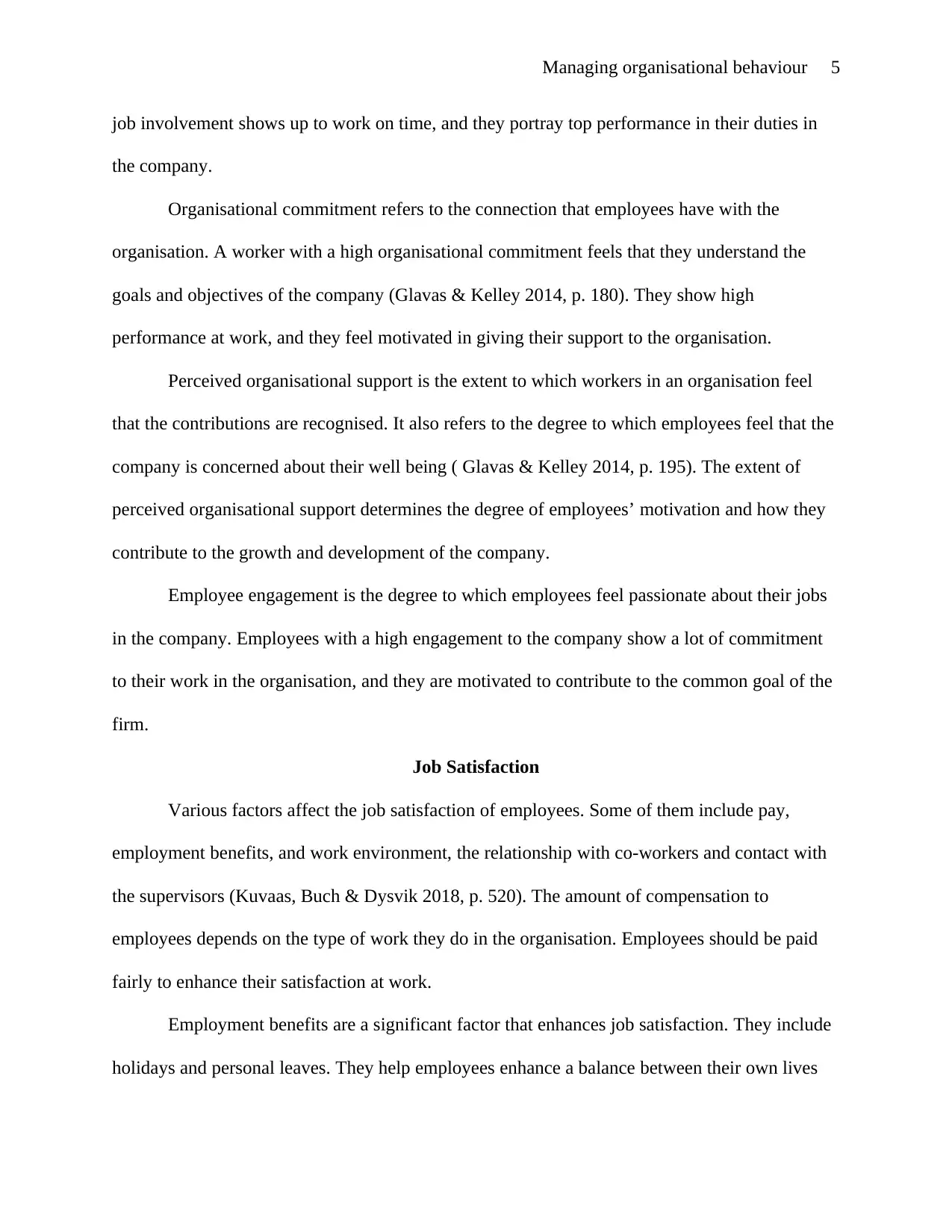
Managing organisational behaviour 5
job involvement shows up to work on time, and they portray top performance in their duties in
the company.
Organisational commitment refers to the connection that employees have with the
organisation. A worker with a high organisational commitment feels that they understand the
goals and objectives of the company (Glavas & Kelley 2014, p. 180). They show high
performance at work, and they feel motivated in giving their support to the organisation.
Perceived organisational support is the extent to which workers in an organisation feel
that the contributions are recognised. It also refers to the degree to which employees feel that the
company is concerned about their well being ( Glavas & Kelley 2014, p. 195). The extent of
perceived organisational support determines the degree of employees’ motivation and how they
contribute to the growth and development of the company.
Employee engagement is the degree to which employees feel passionate about their jobs
in the company. Employees with a high engagement to the company show a lot of commitment
to their work in the organisation, and they are motivated to contribute to the common goal of the
firm.
Job Satisfaction
Various factors affect the job satisfaction of employees. Some of them include pay,
employment benefits, and work environment, the relationship with co-workers and contact with
the supervisors (Kuvaas, Buch & Dysvik 2018, p. 520). The amount of compensation to
employees depends on the type of work they do in the organisation. Employees should be paid
fairly to enhance their satisfaction at work.
Employment benefits are a significant factor that enhances job satisfaction. They include
holidays and personal leaves. They help employees enhance a balance between their own lives
job involvement shows up to work on time, and they portray top performance in their duties in
the company.
Organisational commitment refers to the connection that employees have with the
organisation. A worker with a high organisational commitment feels that they understand the
goals and objectives of the company (Glavas & Kelley 2014, p. 180). They show high
performance at work, and they feel motivated in giving their support to the organisation.
Perceived organisational support is the extent to which workers in an organisation feel
that the contributions are recognised. It also refers to the degree to which employees feel that the
company is concerned about their well being ( Glavas & Kelley 2014, p. 195). The extent of
perceived organisational support determines the degree of employees’ motivation and how they
contribute to the growth and development of the company.
Employee engagement is the degree to which employees feel passionate about their jobs
in the company. Employees with a high engagement to the company show a lot of commitment
to their work in the organisation, and they are motivated to contribute to the common goal of the
firm.
Job Satisfaction
Various factors affect the job satisfaction of employees. Some of them include pay,
employment benefits, and work environment, the relationship with co-workers and contact with
the supervisors (Kuvaas, Buch & Dysvik 2018, p. 520). The amount of compensation to
employees depends on the type of work they do in the organisation. Employees should be paid
fairly to enhance their satisfaction at work.
Employment benefits are a significant factor that enhances job satisfaction. They include
holidays and personal leaves. They help employees enhance a balance between their own lives
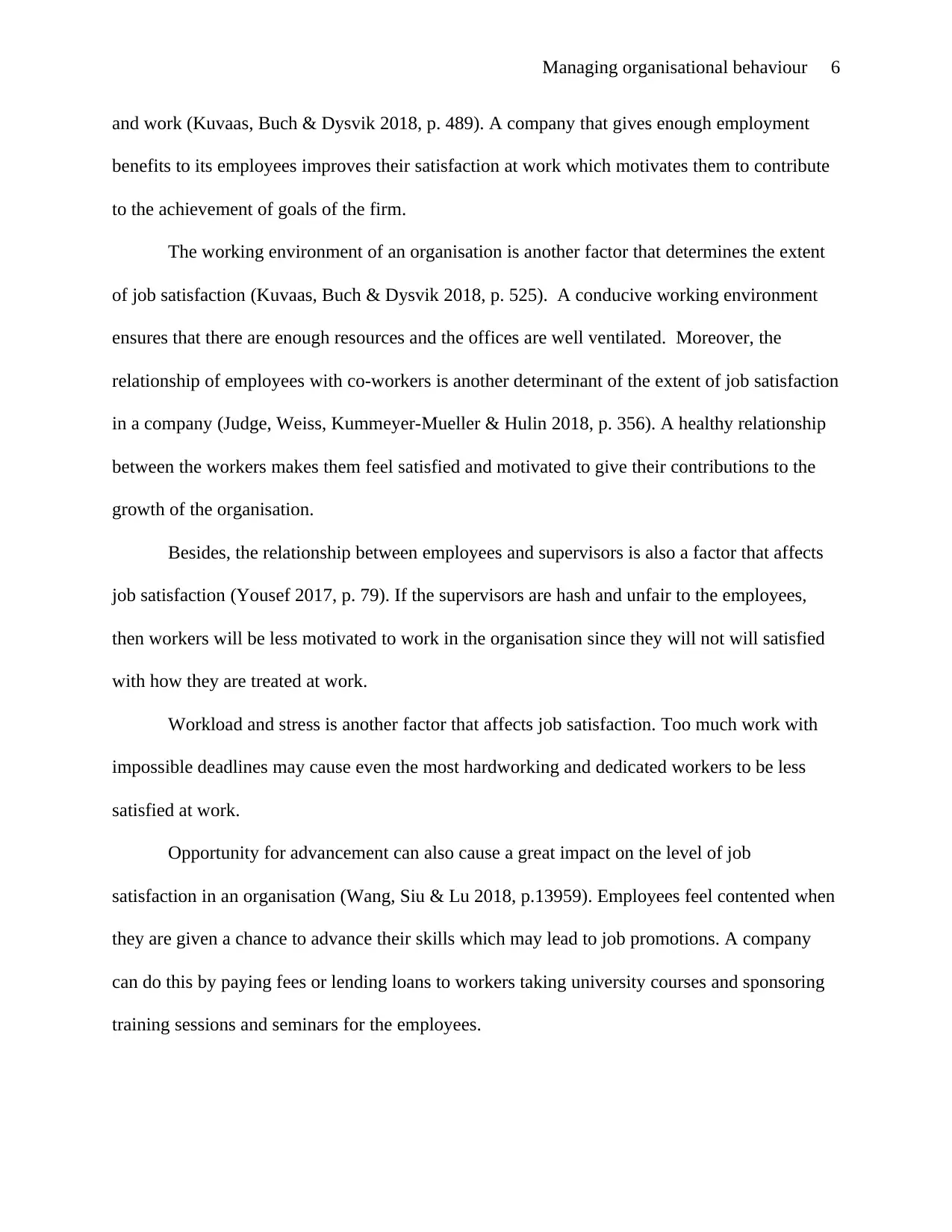
Managing organisational behaviour 6
and work (Kuvaas, Buch & Dysvik 2018, p. 489). A company that gives enough employment
benefits to its employees improves their satisfaction at work which motivates them to contribute
to the achievement of goals of the firm.
The working environment of an organisation is another factor that determines the extent
of job satisfaction (Kuvaas, Buch & Dysvik 2018, p. 525). A conducive working environment
ensures that there are enough resources and the offices are well ventilated. Moreover, the
relationship of employees with co-workers is another determinant of the extent of job satisfaction
in a company (Judge, Weiss, Kummeyer-Mueller & Hulin 2018, p. 356). A healthy relationship
between the workers makes them feel satisfied and motivated to give their contributions to the
growth of the organisation.
Besides, the relationship between employees and supervisors is also a factor that affects
job satisfaction (Yousef 2017, p. 79). If the supervisors are hash and unfair to the employees,
then workers will be less motivated to work in the organisation since they will not will satisfied
with how they are treated at work.
Workload and stress is another factor that affects job satisfaction. Too much work with
impossible deadlines may cause even the most hardworking and dedicated workers to be less
satisfied at work.
Opportunity for advancement can also cause a great impact on the level of job
satisfaction in an organisation (Wang, Siu & Lu 2018, p.13959). Employees feel contented when
they are given a chance to advance their skills which may lead to job promotions. A company
can do this by paying fees or lending loans to workers taking university courses and sponsoring
training sessions and seminars for the employees.
and work (Kuvaas, Buch & Dysvik 2018, p. 489). A company that gives enough employment
benefits to its employees improves their satisfaction at work which motivates them to contribute
to the achievement of goals of the firm.
The working environment of an organisation is another factor that determines the extent
of job satisfaction (Kuvaas, Buch & Dysvik 2018, p. 525). A conducive working environment
ensures that there are enough resources and the offices are well ventilated. Moreover, the
relationship of employees with co-workers is another determinant of the extent of job satisfaction
in a company (Judge, Weiss, Kummeyer-Mueller & Hulin 2018, p. 356). A healthy relationship
between the workers makes them feel satisfied and motivated to give their contributions to the
growth of the organisation.
Besides, the relationship between employees and supervisors is also a factor that affects
job satisfaction (Yousef 2017, p. 79). If the supervisors are hash and unfair to the employees,
then workers will be less motivated to work in the organisation since they will not will satisfied
with how they are treated at work.
Workload and stress is another factor that affects job satisfaction. Too much work with
impossible deadlines may cause even the most hardworking and dedicated workers to be less
satisfied at work.
Opportunity for advancement can also cause a great impact on the level of job
satisfaction in an organisation (Wang, Siu & Lu 2018, p.13959). Employees feel contented when
they are given a chance to advance their skills which may lead to job promotions. A company
can do this by paying fees or lending loans to workers taking university courses and sponsoring
training sessions and seminars for the employees.
⊘ This is a preview!⊘
Do you want full access?
Subscribe today to unlock all pages.

Trusted by 1+ million students worldwide
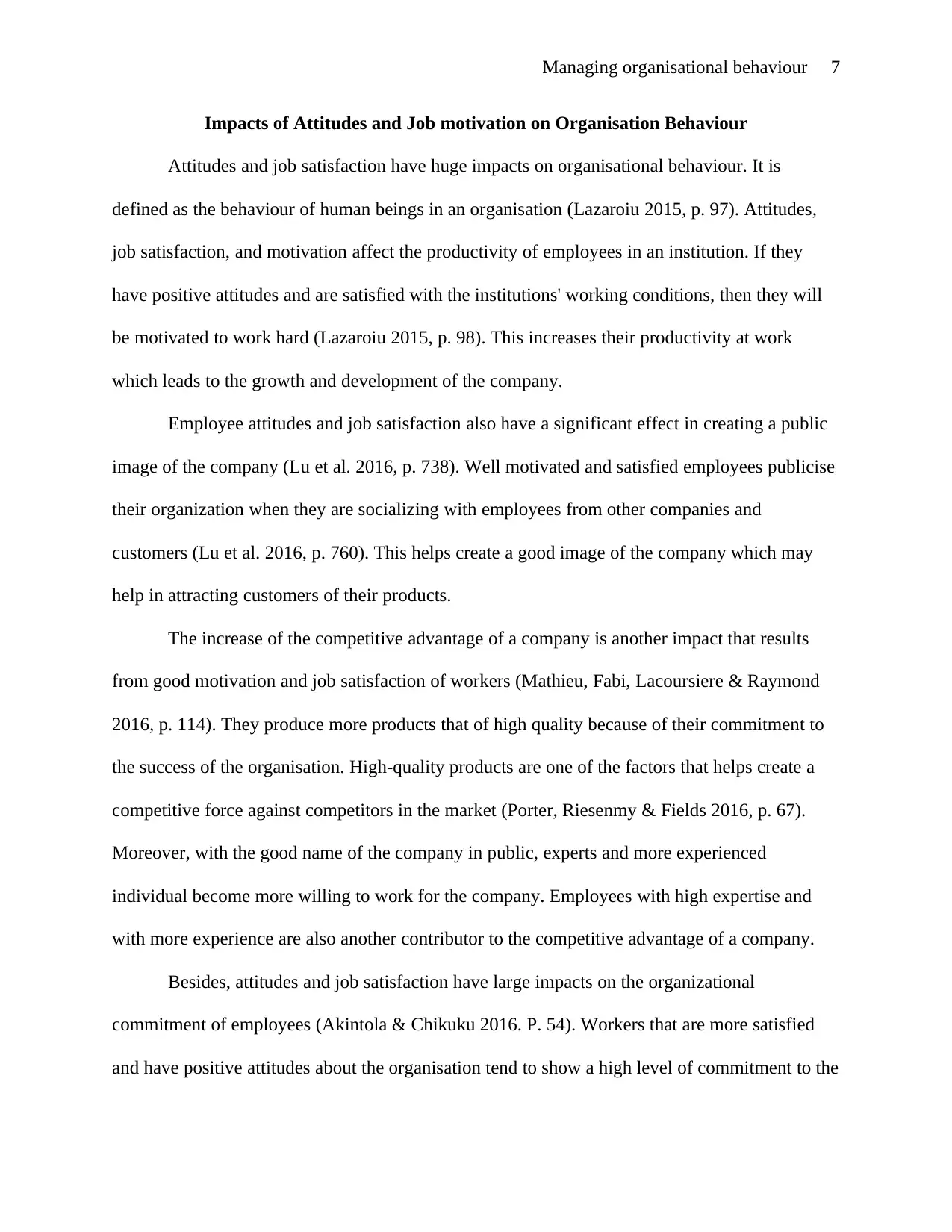
Managing organisational behaviour 7
Impacts of Attitudes and Job motivation on Organisation Behaviour
Attitudes and job satisfaction have huge impacts on organisational behaviour. It is
defined as the behaviour of human beings in an organisation (Lazaroiu 2015, p. 97). Attitudes,
job satisfaction, and motivation affect the productivity of employees in an institution. If they
have positive attitudes and are satisfied with the institutions' working conditions, then they will
be motivated to work hard (Lazaroiu 2015, p. 98). This increases their productivity at work
which leads to the growth and development of the company.
Employee attitudes and job satisfaction also have a significant effect in creating a public
image of the company (Lu et al. 2016, p. 738). Well motivated and satisfied employees publicise
their organization when they are socializing with employees from other companies and
customers (Lu et al. 2016, p. 760). This helps create a good image of the company which may
help in attracting customers of their products.
The increase of the competitive advantage of a company is another impact that results
from good motivation and job satisfaction of workers (Mathieu, Fabi, Lacoursiere & Raymond
2016, p. 114). They produce more products that of high quality because of their commitment to
the success of the organisation. High-quality products are one of the factors that helps create a
competitive force against competitors in the market (Porter, Riesenmy & Fields 2016, p. 67).
Moreover, with the good name of the company in public, experts and more experienced
individual become more willing to work for the company. Employees with high expertise and
with more experience are also another contributor to the competitive advantage of a company.
Besides, attitudes and job satisfaction have large impacts on the organizational
commitment of employees (Akintola & Chikuku 2016. P. 54). Workers that are more satisfied
and have positive attitudes about the organisation tend to show a high level of commitment to the
Impacts of Attitudes and Job motivation on Organisation Behaviour
Attitudes and job satisfaction have huge impacts on organisational behaviour. It is
defined as the behaviour of human beings in an organisation (Lazaroiu 2015, p. 97). Attitudes,
job satisfaction, and motivation affect the productivity of employees in an institution. If they
have positive attitudes and are satisfied with the institutions' working conditions, then they will
be motivated to work hard (Lazaroiu 2015, p. 98). This increases their productivity at work
which leads to the growth and development of the company.
Employee attitudes and job satisfaction also have a significant effect in creating a public
image of the company (Lu et al. 2016, p. 738). Well motivated and satisfied employees publicise
their organization when they are socializing with employees from other companies and
customers (Lu et al. 2016, p. 760). This helps create a good image of the company which may
help in attracting customers of their products.
The increase of the competitive advantage of a company is another impact that results
from good motivation and job satisfaction of workers (Mathieu, Fabi, Lacoursiere & Raymond
2016, p. 114). They produce more products that of high quality because of their commitment to
the success of the organisation. High-quality products are one of the factors that helps create a
competitive force against competitors in the market (Porter, Riesenmy & Fields 2016, p. 67).
Moreover, with the good name of the company in public, experts and more experienced
individual become more willing to work for the company. Employees with high expertise and
with more experience are also another contributor to the competitive advantage of a company.
Besides, attitudes and job satisfaction have large impacts on the organizational
commitment of employees (Akintola & Chikuku 2016. P. 54). Workers that are more satisfied
and have positive attitudes about the organisation tend to show a high level of commitment to the
Paraphrase This Document
Need a fresh take? Get an instant paraphrase of this document with our AI Paraphraser
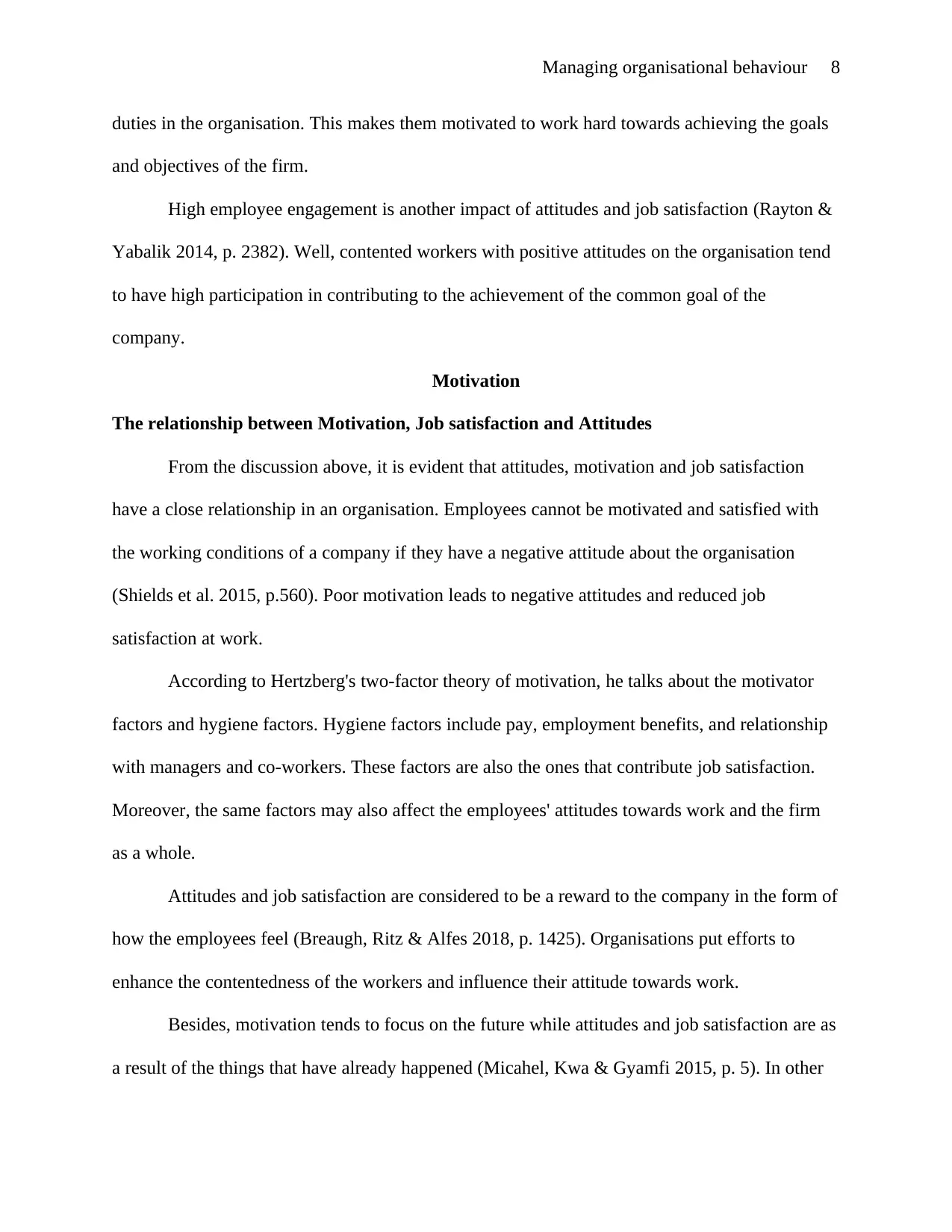
Managing organisational behaviour 8
duties in the organisation. This makes them motivated to work hard towards achieving the goals
and objectives of the firm.
High employee engagement is another impact of attitudes and job satisfaction (Rayton &
Yabalik 2014, p. 2382). Well, contented workers with positive attitudes on the organisation tend
to have high participation in contributing to the achievement of the common goal of the
company.
Motivation
The relationship between Motivation, Job satisfaction and Attitudes
From the discussion above, it is evident that attitudes, motivation and job satisfaction
have a close relationship in an organisation. Employees cannot be motivated and satisfied with
the working conditions of a company if they have a negative attitude about the organisation
(Shields et al. 2015, p.560). Poor motivation leads to negative attitudes and reduced job
satisfaction at work.
According to Hertzberg's two-factor theory of motivation, he talks about the motivator
factors and hygiene factors. Hygiene factors include pay, employment benefits, and relationship
with managers and co-workers. These factors are also the ones that contribute job satisfaction.
Moreover, the same factors may also affect the employees' attitudes towards work and the firm
as a whole.
Attitudes and job satisfaction are considered to be a reward to the company in the form of
how the employees feel (Breaugh, Ritz & Alfes 2018, p. 1425). Organisations put efforts to
enhance the contentedness of the workers and influence their attitude towards work.
Besides, motivation tends to focus on the future while attitudes and job satisfaction are as
a result of the things that have already happened (Micahel, Kwa & Gyamfi 2015, p. 5). In other
duties in the organisation. This makes them motivated to work hard towards achieving the goals
and objectives of the firm.
High employee engagement is another impact of attitudes and job satisfaction (Rayton &
Yabalik 2014, p. 2382). Well, contented workers with positive attitudes on the organisation tend
to have high participation in contributing to the achievement of the common goal of the
company.
Motivation
The relationship between Motivation, Job satisfaction and Attitudes
From the discussion above, it is evident that attitudes, motivation and job satisfaction
have a close relationship in an organisation. Employees cannot be motivated and satisfied with
the working conditions of a company if they have a negative attitude about the organisation
(Shields et al. 2015, p.560). Poor motivation leads to negative attitudes and reduced job
satisfaction at work.
According to Hertzberg's two-factor theory of motivation, he talks about the motivator
factors and hygiene factors. Hygiene factors include pay, employment benefits, and relationship
with managers and co-workers. These factors are also the ones that contribute job satisfaction.
Moreover, the same factors may also affect the employees' attitudes towards work and the firm
as a whole.
Attitudes and job satisfaction are considered to be a reward to the company in the form of
how the employees feel (Breaugh, Ritz & Alfes 2018, p. 1425). Organisations put efforts to
enhance the contentedness of the workers and influence their attitude towards work.
Besides, motivation tends to focus on the future while attitudes and job satisfaction are as
a result of the things that have already happened (Micahel, Kwa & Gyamfi 2015, p. 5). In other
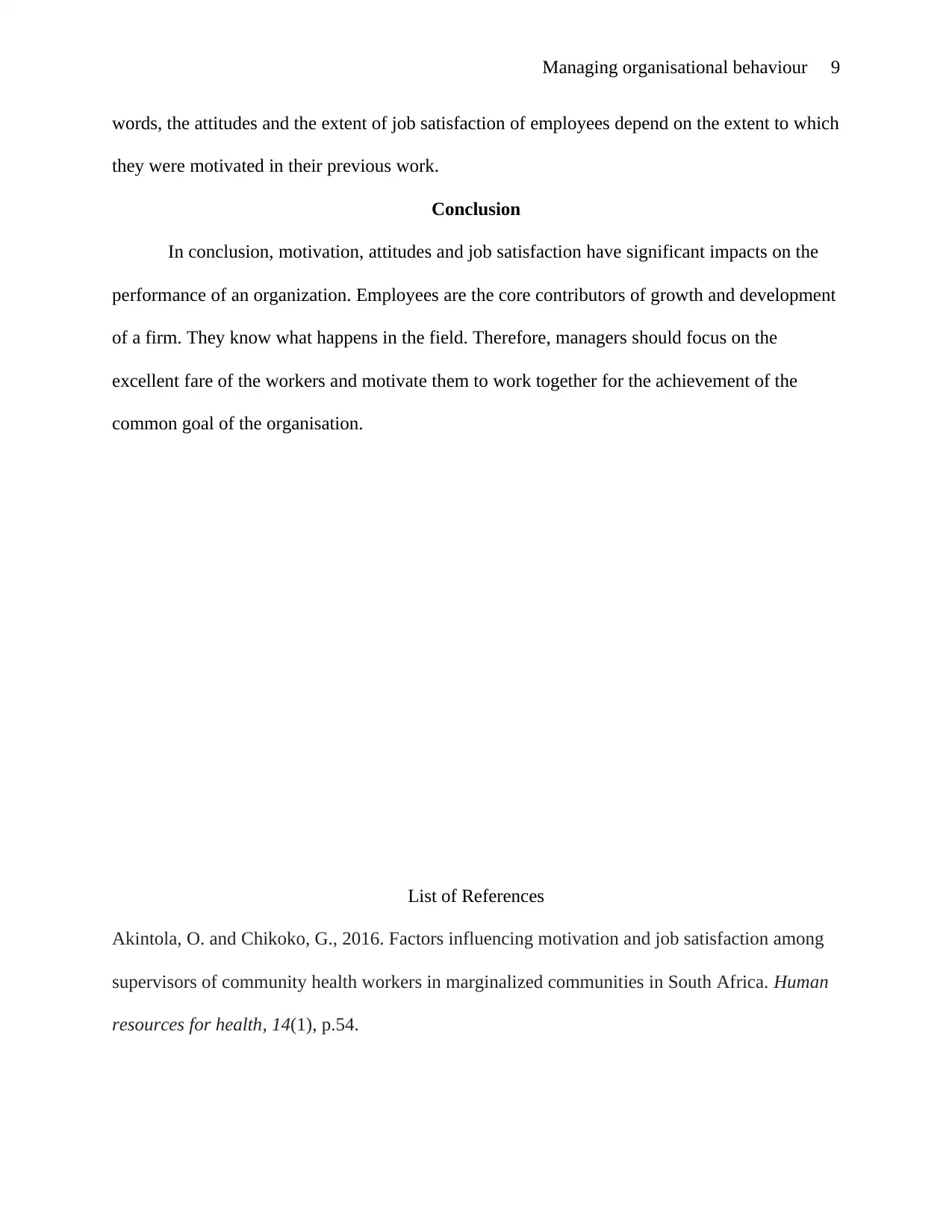
Managing organisational behaviour 9
words, the attitudes and the extent of job satisfaction of employees depend on the extent to which
they were motivated in their previous work.
Conclusion
In conclusion, motivation, attitudes and job satisfaction have significant impacts on the
performance of an organization. Employees are the core contributors of growth and development
of a firm. They know what happens in the field. Therefore, managers should focus on the
excellent fare of the workers and motivate them to work together for the achievement of the
common goal of the organisation.
List of References
Akintola, O. and Chikoko, G., 2016. Factors influencing motivation and job satisfaction among
supervisors of community health workers in marginalized communities in South Africa. Human
resources for health, 14(1), p.54.
words, the attitudes and the extent of job satisfaction of employees depend on the extent to which
they were motivated in their previous work.
Conclusion
In conclusion, motivation, attitudes and job satisfaction have significant impacts on the
performance of an organization. Employees are the core contributors of growth and development
of a firm. They know what happens in the field. Therefore, managers should focus on the
excellent fare of the workers and motivate them to work together for the achievement of the
common goal of the organisation.
List of References
Akintola, O. and Chikoko, G., 2016. Factors influencing motivation and job satisfaction among
supervisors of community health workers in marginalized communities in South Africa. Human
resources for health, 14(1), p.54.
⊘ This is a preview!⊘
Do you want full access?
Subscribe today to unlock all pages.

Trusted by 1+ million students worldwide
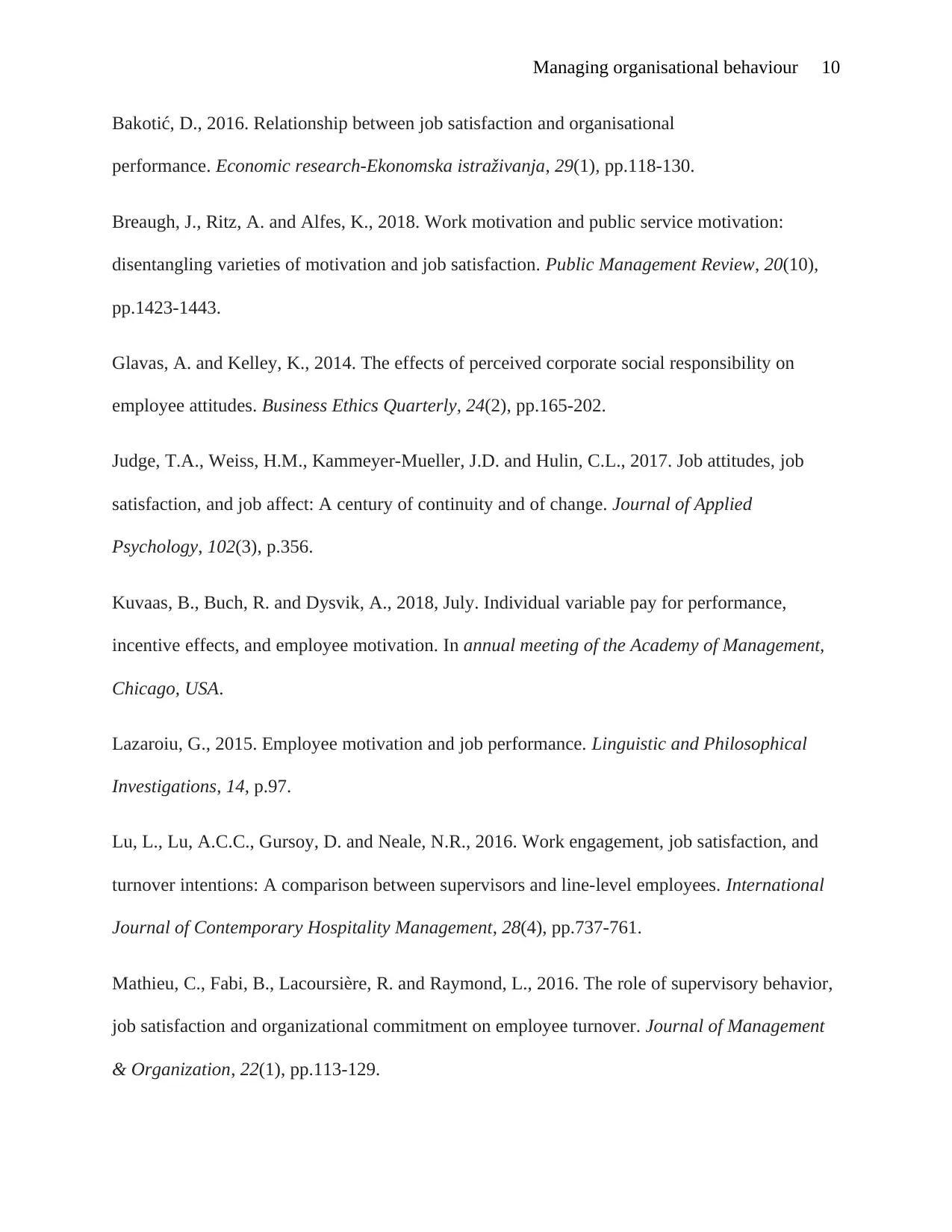
Managing organisational behaviour 10
Bakotić, D., 2016. Relationship between job satisfaction and organisational
performance. Economic research-Ekonomska istraživanja, 29(1), pp.118-130.
Breaugh, J., Ritz, A. and Alfes, K., 2018. Work motivation and public service motivation:
disentangling varieties of motivation and job satisfaction. Public Management Review, 20(10),
pp.1423-1443.
Glavas, A. and Kelley, K., 2014. The effects of perceived corporate social responsibility on
employee attitudes. Business Ethics Quarterly, 24(2), pp.165-202.
Judge, T.A., Weiss, H.M., Kammeyer-Mueller, J.D. and Hulin, C.L., 2017. Job attitudes, job
satisfaction, and job affect: A century of continuity and of change. Journal of Applied
Psychology, 102(3), p.356.
Kuvaas, B., Buch, R. and Dysvik, A., 2018, July. Individual variable pay for performance,
incentive effects, and employee motivation. In annual meeting of the Academy of Management,
Chicago, USA.
Lazaroiu, G., 2015. Employee motivation and job performance. Linguistic and Philosophical
Investigations, 14, p.97.
Lu, L., Lu, A.C.C., Gursoy, D. and Neale, N.R., 2016. Work engagement, job satisfaction, and
turnover intentions: A comparison between supervisors and line-level employees. International
Journal of Contemporary Hospitality Management, 28(4), pp.737-761.
Mathieu, C., Fabi, B., Lacoursière, R. and Raymond, L., 2016. The role of supervisory behavior,
job satisfaction and organizational commitment on employee turnover. Journal of Management
& Organization, 22(1), pp.113-129.
Bakotić, D., 2016. Relationship between job satisfaction and organisational
performance. Economic research-Ekonomska istraživanja, 29(1), pp.118-130.
Breaugh, J., Ritz, A. and Alfes, K., 2018. Work motivation and public service motivation:
disentangling varieties of motivation and job satisfaction. Public Management Review, 20(10),
pp.1423-1443.
Glavas, A. and Kelley, K., 2014. The effects of perceived corporate social responsibility on
employee attitudes. Business Ethics Quarterly, 24(2), pp.165-202.
Judge, T.A., Weiss, H.M., Kammeyer-Mueller, J.D. and Hulin, C.L., 2017. Job attitudes, job
satisfaction, and job affect: A century of continuity and of change. Journal of Applied
Psychology, 102(3), p.356.
Kuvaas, B., Buch, R. and Dysvik, A., 2018, July. Individual variable pay for performance,
incentive effects, and employee motivation. In annual meeting of the Academy of Management,
Chicago, USA.
Lazaroiu, G., 2015. Employee motivation and job performance. Linguistic and Philosophical
Investigations, 14, p.97.
Lu, L., Lu, A.C.C., Gursoy, D. and Neale, N.R., 2016. Work engagement, job satisfaction, and
turnover intentions: A comparison between supervisors and line-level employees. International
Journal of Contemporary Hospitality Management, 28(4), pp.737-761.
Mathieu, C., Fabi, B., Lacoursière, R. and Raymond, L., 2016. The role of supervisory behavior,
job satisfaction and organizational commitment on employee turnover. Journal of Management
& Organization, 22(1), pp.113-129.
Paraphrase This Document
Need a fresh take? Get an instant paraphrase of this document with our AI Paraphraser
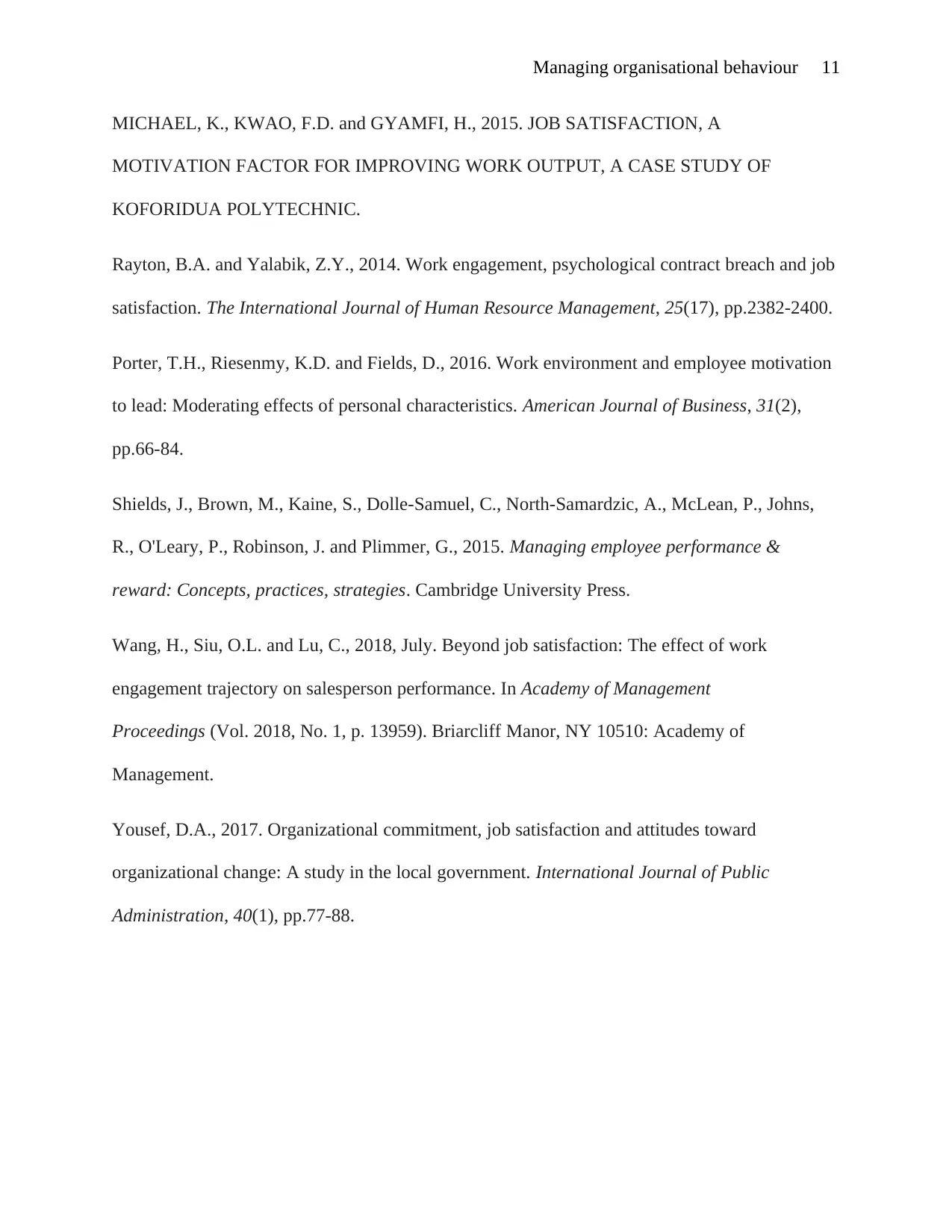
Managing organisational behaviour 11
MICHAEL, K., KWAO, F.D. and GYAMFI, H., 2015. JOB SATISFACTION, A
MOTIVATION FACTOR FOR IMPROVING WORK OUTPUT, A CASE STUDY OF
KOFORIDUA POLYTECHNIC.
Rayton, B.A. and Yalabik, Z.Y., 2014. Work engagement, psychological contract breach and job
satisfaction. The International Journal of Human Resource Management, 25(17), pp.2382-2400.
Porter, T.H., Riesenmy, K.D. and Fields, D., 2016. Work environment and employee motivation
to lead: Moderating effects of personal characteristics. American Journal of Business, 31(2),
pp.66-84.
Shields, J., Brown, M., Kaine, S., Dolle-Samuel, C., North-Samardzic, A., McLean, P., Johns,
R., O'Leary, P., Robinson, J. and Plimmer, G., 2015. Managing employee performance &
reward: Concepts, practices, strategies. Cambridge University Press.
Wang, H., Siu, O.L. and Lu, C., 2018, July. Beyond job satisfaction: The effect of work
engagement trajectory on salesperson performance. In Academy of Management
Proceedings (Vol. 2018, No. 1, p. 13959). Briarcliff Manor, NY 10510: Academy of
Management.
Yousef, D.A., 2017. Organizational commitment, job satisfaction and attitudes toward
organizational change: A study in the local government. International Journal of Public
Administration, 40(1), pp.77-88.
MICHAEL, K., KWAO, F.D. and GYAMFI, H., 2015. JOB SATISFACTION, A
MOTIVATION FACTOR FOR IMPROVING WORK OUTPUT, A CASE STUDY OF
KOFORIDUA POLYTECHNIC.
Rayton, B.A. and Yalabik, Z.Y., 2014. Work engagement, psychological contract breach and job
satisfaction. The International Journal of Human Resource Management, 25(17), pp.2382-2400.
Porter, T.H., Riesenmy, K.D. and Fields, D., 2016. Work environment and employee motivation
to lead: Moderating effects of personal characteristics. American Journal of Business, 31(2),
pp.66-84.
Shields, J., Brown, M., Kaine, S., Dolle-Samuel, C., North-Samardzic, A., McLean, P., Johns,
R., O'Leary, P., Robinson, J. and Plimmer, G., 2015. Managing employee performance &
reward: Concepts, practices, strategies. Cambridge University Press.
Wang, H., Siu, O.L. and Lu, C., 2018, July. Beyond job satisfaction: The effect of work
engagement trajectory on salesperson performance. In Academy of Management
Proceedings (Vol. 2018, No. 1, p. 13959). Briarcliff Manor, NY 10510: Academy of
Management.
Yousef, D.A., 2017. Organizational commitment, job satisfaction and attitudes toward
organizational change: A study in the local government. International Journal of Public
Administration, 40(1), pp.77-88.
1 out of 11
Related Documents
Your All-in-One AI-Powered Toolkit for Academic Success.
+13062052269
info@desklib.com
Available 24*7 on WhatsApp / Email
![[object Object]](/_next/static/media/star-bottom.7253800d.svg)
Unlock your academic potential
Copyright © 2020–2026 A2Z Services. All Rights Reserved. Developed and managed by ZUCOL.





